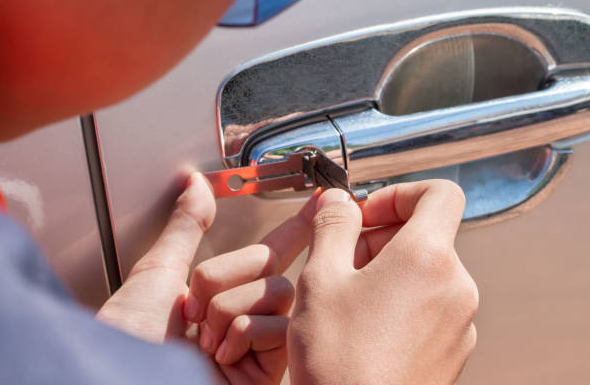In today’s automotive landscape, keys have evolved significantly from the simple metal designs of the past. Traditional car keys and modern smart keys serve the same fundamental purpose—unlocking and starting your vehicle—but they do so in very different ways. Understanding these differences can help you appreciate the advancements in vehicle technology and choose the right options for your needs. Let’s explore the distinctions between traditional and smart car keys.
Design and Functionality
Traditional Car Keys
Traditional car keys are typically made of metal and have a straightforward design that includes a blade that fits into the lock of the vehicle’s doors and ignition. These keys operate mechanically, meaning that inserting the key and turning it physically engages the locking and starting mechanisms.
Smart Car Keys
Smart car keys, also known as key fobs or remote keys, feature advanced technology that goes beyond mere mechanical operation. These keys often contain electronic components and use radio frequency identification (RFID) or Bluetooth technology. Smart keys allow for keyless entry and can start the vehicle with the push of a button, provided the key is in proximity to the car.
Security Features
Traditional Car Keys
While traditional keys provide a basic level of security, they are susceptible to theft and duplication. If someone manages to obtain a physical copy of your key, they can easily access your vehicle. Additionally, if your key is lost or stolen, the entire lock system may need to be rekeyed or replaced to ensure your vehicle remains secure.
Smart Car Keys
Smart keys offer enhanced security features, including encrypted signals and rolling codes, which make it significantly more challenging for thieves to duplicate or intercept them. Many smart keys also come with immobilizer technology, preventing the vehicle from starting without the correct key present. This added layer of security can be a strong deterrent against vehicle theft.
Convenience and Usability
Traditional Car Keys
Using traditional keys can be less convenient, especially when juggling bags or groceries. You need to physically insert the key into the lock and turn it, which can be cumbersome. Additionally, if you misplace your key, locating and retrieving it can be time-consuming.
Smart Car Keys
Smart keys shine in terms of convenience. With keyless entry, you can unlock your car doors simply by approaching with the key fob in your pocket or bag. Many smart keys also enable push-button starts, allowing you to start your vehicle without inserting a key at all. This seamless integration into daily life is one of the reasons many drivers prefer smart keys over traditional options.
Cost and Maintenance
Traditional Car Keys
Traditional keys are generally less expensive to replace and duplicate compared to smart keys. However, if you lose a traditional key and need to replace the ignition lock, the costs can add up. Regular wear and tear can also lead to key bending or breaking, which might necessitate a replacement.
Smart Car Keys
Smart keys are typically more expensive to replace or program due to their advanced technology and the need for specialized equipment. If you lose a smart key, it often requires reprogramming the vehicle’s computer system to prevent unauthorized access. While this adds to the initial investment, the long-term security benefits may outweigh the costs for many vehicle owners.
Future Trends and Developments
As automotive technology continues to advance, the trend is leaning towards smart keys and integrated vehicle systems. Many manufacturers are incorporating features such as smartphone integration, where you can control various functions of your vehicle using an app on your phone. This innovation represents the future of vehicle access and control, blending convenience with cutting-edge technology.
Conclusion
The evolution from traditional car keys to smart keys reflects broader advancements in Edmond automotive technology and security. While traditional keys offer simplicity and cost-effectiveness, smart keys provide enhanced security, convenience, and innovative features that cater to modern lifestyles.
Understanding the differences between these two types of keys can help you make informed decisions about your vehicle’s security and functionality. Whether you prefer the straightforward nature of traditional keys or the high-tech features of smart keys, it’s essential to choose a solution that best fits your needs and enhances your driving experience. As technology continues to evolve, staying informed about these advancements will ensure you make the most of your vehicle’s capabilities.
FAQs
What is the main difference between traditional and smart car keys?
Traditional car keys are mechanical and require physical insertion and turning to unlock and start the vehicle. Smart car keys utilize electronic technology, allowing for keyless entry and push-button start functions.
Are smart keys more secure than traditional keys?
Yes, smart keys typically offer enhanced security features such as encrypted signals and immobilizer technology, making them harder to duplicate or intercept compared to traditional keys.
What happens if I lose my smart key?
If you lose a smart key, you’ll likely need to contact a locksmith or your dealership to have a replacement key programmed, which may also require reprogramming your vehicle’s computer system to prevent unauthorized access.
Can I duplicate a traditional car key myself?
Yes, traditional keys can often be duplicated at hardware stores or locksmiths. However, duplication of smart keys usually requires specialized equipment and should be done by a professional.
How much does it cost to replace a smart key?
Replacing a smart key can be more expensive than a traditional key, typically ranging from $100 to $400, depending on the vehicle and the technology involved.



